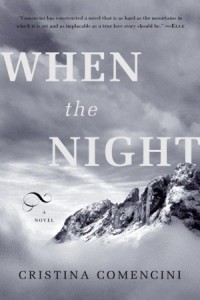When the Night by Cristina Comencini
 Monday, April 23, 2012 at 6:14AM
Monday, April 23, 2012 at 6:14AM 
First published in Italian in 2009; published in translation by Other Press on April 24, 2012
When the Night is a dark and oddly beautiful story of two regret-filled souls struggling to break free from their confining personalities. The novel records two intersecting moments in their lives, fifteen years apart -- in many ways their most vital moments.
Mountain guide Manfred Sane and his brothers were raised by their father after their mother ran off with an American tourist. Before the novel opens, Manfred’s wife, Luna, has left, taking their children with her. Manfred has rented an apartment above his to Marina, who has taken her son to the mountains for a month, leaving her husband behind. Marina is depressed; she hasn’t bonded with her son Marco, she never sleeps, she feels lonely and inadequate. She is the opposite of the Supermom: she wasn’t cut out for motherhood and she knows it. Still, she hopes her stay in the mountains will renew her strength.
Manfred is silent, bitter, and abusive. He learned from his father that women are not to be trusted. Manfred’s observation of Marina, and particularly of her coma-like response when Marco is injured, reinforces his belief that children should be taken away from their mother as soon as they are born. He suspects that Marina has deliberately harmed Marco, a suspicion instilled by his long-standing contempt for women. He considers it his duty to provoke her confession.
As the novel unfolded I wondered whether it would turn into an unlikely love story or whether Manfred would kill Marina. Are they two ships passing in the night or two ships colliding? In its final section, When the Night jumps forward fifteen years. The change (or lack of fundamental change) in the characters during the gap years makes clear that the month Marina spent in the mountains was pivotal for both of them. But what does the present hold?
When the Night is told from the alternating points of view of Manfred and Marina. Sometimes, when the two are together, the point of view changes from sentence to sentence. The mild confusion that technique occasionally causes is more than offset by the value of seeing the same events almost simultaneously from opposing perspectives.
This isn’t a novel for readers who search for likable characters. Still, there is understanding to be gained from the rather extreme examples the main characters offer of gender-based personality differences. Although Marina is far from a prototypical female (given her lack of maternal instinct) and Manfred is a poor example of a male (given the disgust he feels in the company of women), their interaction with each other is quite typical: Marina probes for a way to connect while Manfred is guarded, unwilling to open himself for her inspection. Their differing perceptions impair their ability to communicate; they often speak at cross-purposes, fighting to connect in a moment of shared honesty.
It is in their extremes, however, that the characters offer the most insight. Both characters are filled with self-loathing, although Marina is more honest with herself. Manfred feels protective of Marco, perhaps with some cause but also because he distrusts the ability of any woman to raise a male child -- a product of his feeling of abandonment by his mother. More than that, he feels the need to punish Marina for being a bad mother (perhaps born of a desire to punish his own mother). He believes “you need to be strong to raise children” and Marina is anything but strong. Manfred is the personification of misogyny yet he finds himself drawn to Marina, seemingly against his will. Marina both loves and hates her son. She loves her husband but hates him for not understanding her. She yearns for romance but doesn’t believe in it; she views husbands as interchangeable, the choice of one man versus another as arbitrary, yet she finds herself drawn to Manfred.
Manfred’s perspective is told in stark language, featuring the sort of abruptly ending sentences that befit a man who doesn’t like to talk. Marina’s perspective is narrated in a more descriptive style. In both cases, Cristina Comencini writes penetrating prose that fully reveals two tortured individuals, apparently incapable of becoming the persons they want to be. This short novel virtually chisels its characters from the mountains that surround them, exposing multiple facets, sharp edges, hidden features and cold facades. Fans of character-driven fiction are particularly likely to regard When the Night as a memorable novel.
RECOMMENDED